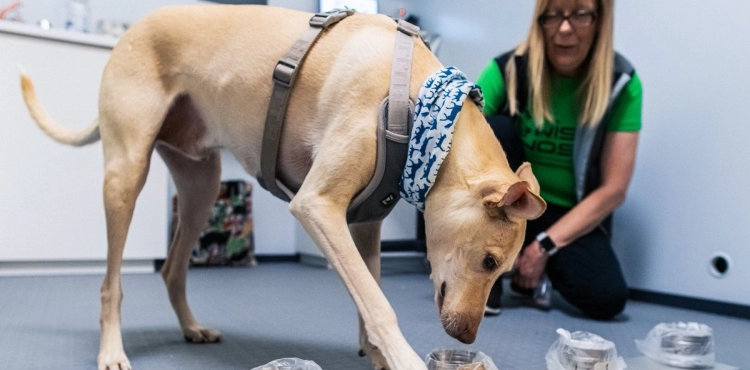Dogs can be trained to detect more than 90 percent of Covid-19 infections even when patients are asymptomatic, according to research published Monday that hopes to obviate the need to isolate incoming travelers.
Thanks to the remarkable sense of smell that enables them to spot the equivalent of half a teaspoon of sugar in an Olympic swimming pool, dogs have already shown that they can smell diseases like cancer, malaria and epilepsy.
After many previous studies had proven the concept that dogs could detect SARS-Cove-2, researchers from the London College of Tropical Medicine wanted to know if dogs were able to detect a distinct smell that emits from chemical compounds associated with a person infected with the Coronavirus but not showing symptoms.
So they collected samples of clothing and face masks from people who had tested positive for SARS-Cove-2, whether it was mild or asymptomatic.
Socks samples from 200 Covid-19 cases were collected and arranged in the laboratory, and then presented to six dogs, which were trained to indicate the presence or absence of the chemical compound in them.
The dogs were trained not to give "false positive" results to prevent circumventing the reward system and obtaining rewards even if there were no Covid-19 samples on a particular test.
"This means that the dog fully understands and is rewarded for a correct negative as well as a correct positive result," said Claire Guest of the College of Infectious and Tropical Diseases.
Overall, dogs were able to identify 94 to 82% of SARS-Cove-2 samples.
Then the researchers modeled how effective these success rates were, along with traditional COVID-19 polymerase chain reaction (PCR) tests, in detecting mild or asymptomatic COVID-19 cases.
They found that using dogs to screen arrivals to airports, for example, could detect 91 percent of cases, resulting in a 2.24 times lower transmission rate than PCR tests alone.
The authors of the research, which has not yet been published in a peer-reviewed journal, said they hope it will eventually replace the need to quarantine travelers, which is a burden for every traveler even though the vast majority of travelers do not have a positive COVID-19 test. .
Co-author James Logan said: “The important thing is that dogs are much faster than other tests. … What we suggest is that dogs do the initial screening, and then those who have indicated positive be asked to take a BCR test. ”
The team said that of the passengers on a plane carrying about 300 people, less than 1 percent were statistically likely to carry the SARS-Cove-2 virus.
Under current quarantine regulations used by some countries, all 300 passengers will need to be in isolation, which is extremely inconvenient.
But given the large smelling ability of trained dogs, a maximum of 35 people on that plane will be recognized by dogs as carrying the virus.
Of these, only about 3 would be expected to test positive.
"This is a really important start and could lead to a beneficial and usable system," said Mick Bailey, a professor of comparative immunology at the University of Bristol who was not involved in the research.
But he added, "There is a lot of scrutiny required to validate this practice before we can be confident that dogs can accurately detect SARS-Cove-2 infection asymptomatically in people at airports and train stations."
Dogs can detect corona injuries at the airport












